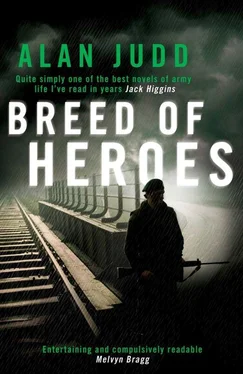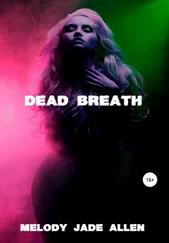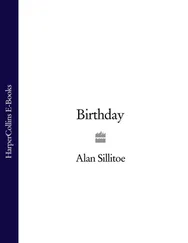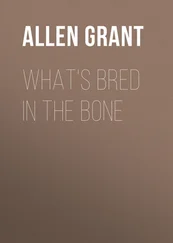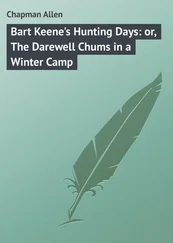Alan Judd - A Breed of Heroes
Здесь есть возможность читать онлайн «Alan Judd - A Breed of Heroes» весь текст электронной книги совершенно бесплатно (целиком полную версию без сокращений). В некоторых случаях можно слушать аудио, скачать через торрент в формате fb2 и присутствует краткое содержание. Год выпуска: 2011, ISBN: 2011, Издательство: Simon & Schuster UK, Жанр: Современная проза, на английском языке. Описание произведения, (предисловие) а так же отзывы посетителей доступны на портале библиотеки ЛибКат.
- Название:A Breed of Heroes
- Автор:
- Издательство:Simon & Schuster UK
- Жанр:
- Год:2011
- ISBN:9781847397720
- Рейтинг книги:3 / 5. Голосов: 1
-
Избранное:Добавить в избранное
- Отзывы:
-
Ваша оценка:
- 60
- 1
- 2
- 3
- 4
- 5
A Breed of Heroes: краткое содержание, описание и аннотация
Предлагаем к чтению аннотацию, описание, краткое содержание или предисловие (зависит от того, что написал сам автор книги «A Breed of Heroes»). Если вы не нашли необходимую информацию о книге — напишите в комментариях, мы постараемся отыскать её.
Alan Judd tells Thoroughgood’s tale with verve, compassion and humour. The result is an exceptionally fine novel which blends bitter human incident with army farce.
A Breed of Heroes — читать онлайн бесплатно полную книгу (весь текст) целиком
Ниже представлен текст книги, разбитый по страницам. Система сохранения места последней прочитанной страницы, позволяет с удобством читать онлайн бесплатно книгу «A Breed of Heroes», без необходимости каждый раз заново искать на чём Вы остановились. Поставьте закладку, и сможете в любой момент перейти на страницу, на которой закончили чтение.
Интервал:
Закладка:
All times were busy for Nigel Beale, as he regarded all information as Intelligence. What he regarded as a major coup, and which sent him into a passion of intense secrecy for several days, occurred with the arrest of a squalid, middle-aged, incoherent man smelling of whisky, who had returned from the United States in order to avenge the murder of his brother, the victim of an IRA feud. He had in his jacket pocket a loaded Colt.45 and over two hundred and fifty Green Shield stamps. He kept saying that he was going to wipe out the Provisional leadership. ‘Why did you arrest him?’ Charles asked Nigel.
Nigel was immediately on guard. ‘What makes you think we have?’
‘I saw him, like everyone else. I spoke to him on the way in. He seemed keen to talk. He was drunk.’
‘You’re not supposed to know. Keep it quiet.’
‘Why don’t you let him go so that he could kill them? We could give him their addresses.’
‘There’s more to this than meets the eye.’
‘What?’
‘Need to know.’
But nothing happened. The man went to prison for possession of a firearm and was not heard of again. The leaders of the Provisionals continued to come and go as they pleased.
Meanwhile the deal with Beazely continued to work well. Charles and Van Horne regularly wrote his reports and he paid just as regularly. They did not even have to see him very often as most business was conducted over the phone. This suited Beazely particularly well as he became ever more reluctant to leave his hotel. ‘They’re going to get me,’ he said in his cups one day. ‘I know they are. I can feel it in my bones, or wherever you’re supposed to feel these things. They’re coming for me.’
‘Why you? They don’t even know you.’
‘Why not? They don’t need to. It happens to other people. A bloke walks to work and a tile falls off a roof and kills him. Why him? you say. Why not? I say. It has to be someone. And I’m in a city where people are actually trying to kill each other and succeeding too bloody well for my liking. Well, one fine day it’s going to be me. I just have this feeling it’s going to happen.’
‘It needn’t be you. It could be me or Van Horne.’
‘It’s a comforting thought, Charlie, and kind of you to say so, and if it had to be one or the other I’d be a little happier. But it’s more likely to be as well as, you see. You and me and Van Horne, but most likely just me.’
Meanwhile, the money mounted up, and Charles, with three weeks left in Northern Ireland, was within one hundred and thirty of his five hundred pounds. He needed a couple of big stories to supplement the continuing trickle of small ones.
One evening he was writing the minutes of the latest community relations committee meeting, which had lasted twelve minutes and had been chaired as usual by Anthony Hamilton-Smith, who had had to leave early, when he was summoned downstairs to deal with a complaint. The complaints desk was on the ground floor of the police station, just off the entrance hall. It was a chore which he shared with the adjutant. Complaints were either vivid and obviously false, or exaggerated and based on an uncheckable truth, or true and checkable but impossible to do anything about. There had been two cases where soldiers had been reprimanded, once for damage to property and once for brutality, and the victims had been compensated; but the issues were rarely clear-cut, and the truth of the matter was invariably unclear. On this occasion the complainant was Mary Magdalene, a girl from the Falls area whose nickname, origin unknown, had been passed on by the previous unit. She was unusual in that she was young, attractive and a graduate of Queen’s University. Her complaints were detailed, literate and always minor, but nevertheless demanding extensive and time-consuming investigation. Despite this Charles and Colin Wood competed for her, a battle which Colin was winning as he held the complaints file to which, with her, reference always had to be made. The affair of the V-sign and the invitation allegedly delivered to her by a soldier from the back of a Land-Rover had provoked a lengthy and dignified correspondence between her and Colin which was the outstanding feature of the file. It finally petered out because of an inability to agree whether the intention behind such gestures and invitations was to flatter and compliment or to shock, degrade and terrorise.
She was already seated at the desk when Charles got there. There was no need to go through the preliminaries with her and so he pushed an empty form across. Though it was one of the unwritten rules with her that neither side ever smiled or indicated friendship, it was clear that she enjoyed the process, and manners were kept at all times. ‘Would you please get me a pen,’ she said.
‘Of course.’ This was a new development. He had left his upstairs and looked about for one, noticing her long, carelessly crossed legs and trying not to stare at them.
‘On second thoughts, I believe I’m permitted to dictate my complaint, am I not?’
‘You are, yes, but I still need a pen.’ In the end he borrowed one from the RUC man at the desk in the entrance hall. Mary Magdalene got a light for her cigarette from a grinning corporal of the regimental police. She uncrossed and recrossed her legs. She had Irish looks of the best sort — dark hair, blue eyes, pale complexion and a gentle directness of expression that, for dealings with the Army, hardened into a provocative determination. ‘Are you ready?’ she asked.
Charles held his pen poised. ‘Carry on.’ She set off at great speed and he had to ask her to slow down, which was one up to her. The complaint concerned the searching of a car in which she and her parents were travelling. They had signed the clearance certificate to say that nothing had been damaged but when they had asked the soldiers under what authority they were acting they had been foully abused. Worse, her father had been propped up against the car and searched, his feet kicked apart, and he had then been pushed roughly back into the car when he protested. She dictated fluently and several times spelt words aloud, unnecessarily. Charles was able to get even on this by asking her to repeat them. When every last detail had been completed to her satisfaction, and she had read it, she signed and Charles took the form back upstairs. A telephone call would confirm whether or not there had been a VCP at the time and place she had said.
The adjutant had turned his back on his overflowing in tray and was leaning against the window, smoking. He was gazing at the shattered lamp-post on the other side of the road, another victim of urban guerrilla warfare. About half a pound of gelignite had been strapped to it one night the previous week, for no apparent purpose. A few yards away stood the telephone junction box which controlled all the police station’s telecommunications.
‘Mary Magdalene,’ said Charles. ‘All legs this evening.’
‘Bitch.’
‘She claims that she and her mummy and daddy were abused at a VCP last night.’
Colin grinned. ‘Ah. We’ve got her this time. I know about it. The soldiers concerned were bright enough to report it and C company rang through this morning. They must’ve known who she was. Their version is that the old man took a swing at one of them. I think it’s probably true otherwise they’d have kept quiet about it.’ He stubbed out his cigarette and picked up the rest of the packet. ‘Give me the form and I’ll go and suggest that her statement be broadened to include all the facts. She must’ve had enough of you, anyway. She’ll be wanting the real thing now.’
He went out with the form and Charles sat down at his desk. It occurred to him that no one would notice if he fabricated the minutes of the community relations committee. He balanced on the rear two legs of his chair, resting the back of his head against the wall. Someone shouted something from the ground floor. He decided to do a trial run. He would invent a project which had come to nothing and see if it was commented on. If it were he could always say it was a hangover from the previous unit. He would start with a detailed description of what it was and then go on to show why it was impossible for it ever to have worked and record the committee’s unanimous decision. He sat the chair down on four legs again and bent forward over his desk, his elbows resting upon it. His pen had almost completed the T of ‘also’ when a sheet of redness leapt up from the floor in front of his desk. Simultaneously, a tremendous shock whipped up through the seat of his chair and the soles of his feet, stinging his calves and thighs. He felt himself rising, along with his desk and chair, and suddenly was near the ceiling. He brought his hands up to protect his face and then toppled backwards and half right. He landed on his right side in a foetal position, his knees up to his chest and his head in his arms. He felt he was enveloped in a continuous roar as in a great sea. After he hit the ground there was the sound of things falling and smashing all around him.
Читать дальшеИнтервал:
Закладка:
Похожие книги на «A Breed of Heroes»
Представляем Вашему вниманию похожие книги на «A Breed of Heroes» списком для выбора. Мы отобрали схожую по названию и смыслу литературу в надежде предоставить читателям больше вариантов отыскать новые, интересные, ещё непрочитанные произведения.
Обсуждение, отзывы о книге «A Breed of Heroes» и просто собственные мнения читателей. Оставьте ваши комментарии, напишите, что Вы думаете о произведении, его смысле или главных героях. Укажите что конкретно понравилось, а что нет, и почему Вы так считаете.
